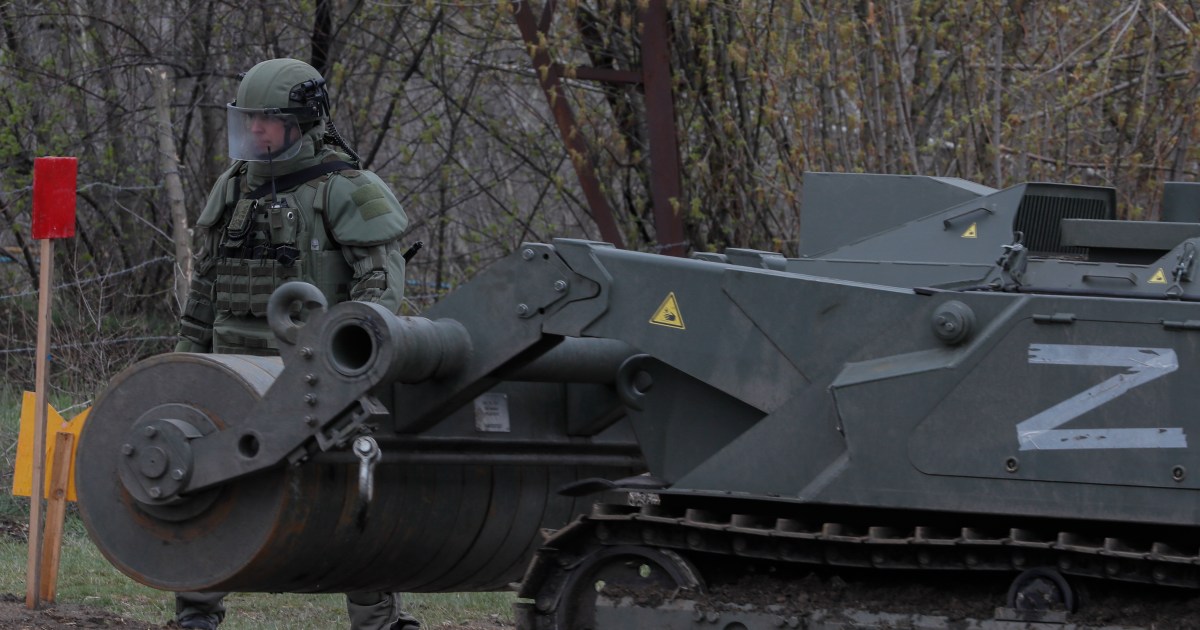Moscow -
Russia capped 130 days of its special military operation in Ukraine by declaring full control of Luhansk and the neighboring residential areas, after fierce battles fought to seize Lyschansk, which observers saw as the beginning of the inevitable control of the Donbass region.
According to Russian Defense Minister Sergei Shoigu, 2,218 Ukrainian soldiers were killed as a result of the battles for control of Lugansk and 3,251 were wounded, in violent clashes that lasted for two weeks, in which, along with the Russian regular forces, a battalion of Chechen fighters, "Cossack" regiments and fighters from the "Wagner" group took part. .
From now on, according to the Russian point of view, the entirety of the Lugansk Republic will have acquired its historical borders, and thus the area of territory controlled by the Russian forces hitherto has reached 670 km.
incomplete success
Russian military experts assess the entry to the Lugansk administrative border as the second significant success of the Russian forces in Donbass after the capture of Mariupol.
However, it remains for these forces to achieve "complete success" to push the Ukrainian forces as far as possible away from the Russian borders, and to secure the population of the border areas.
Experts expect that the main military actions will move into the Donetsk regions, specifically to Kramatorsk and Slaviansk, and they do not rule out a field activation on the axis of the Kharkiv region.
Military expert Dmitry Poltevkin believes that the expulsion of Ukrainian forces from Luhansk paves the way for the control of the "Donetsk Republic", part of which is still under the control of Ukrainian forces.
He continues that the Russian forces will begin the process of controlling Bakhmut, which is the most appropriate point - according to him - to strike against the heavily fortified area by Ukrainian forces, on the Seversk-Solidar, Bakhmut-Turetsk line, in which Ukrainian forces estimated at 70,000 fighters are stationed. .
The military expert points out that controlling Luhansk does not mean ensuring its security from Ukrainian bombing, given the quality of weapons in the Ukrainian army, which requires (in his opinion) to push the Ukrainian armed forces back 300-500 km from the borders of the region, i.e. to the Dnieper and the borders of the Kharkov and Poltava regions. , which is the upper limit of the missile technology control system, explaining that the countries participating in the missile technology control system, including NATO, refrain from supplying longer-range missiles.
years of waiting
On the other hand, military expert Viktor Litovkin asserts that the control of Luhansk will have a frustrating effect on the Ukrainian army, which suffers from defeat after defeat, and at the same time, it is an important achievement for the Russian army and its allied forces.
He added in an interview with Al-Jazeera Net, "Ukrainian soldiers surrender and flee, and Ukraine has nothing to renew its reserves, so it began to summon women, and even by issuing a decision on the recruitment of disabled people for military service, which are indications that Russian forces are working successfully in this direction after 8 years of waiting that he lived." residents of the region,” he said.
The expert points out that it is now extremely important to protect the captured areas from the bombing of the Ukrainian forces, adding that "it is expected that the Ukrainian army will take any reaction, as they have talked more than once about the possibility of targeting cities, and bombing the Crimean bridge itself."
In his opinion, the goal is "to sow doubts in Russian society about the correctness of the Kremlin's policy, so that people begin to express their dissatisfaction."
start control
As for the head of the International Center for Political Analysis, Denis Krkodinov, described the conclusion of the Battle of Luhansk very important for Russia, and that it would be "the beginning of the liberation of the entire Donbass region."
He expected the launch of a large-scale reconstruction process in the city, and a decision to hold a referendum on joining Russia or other measures in this direction, most likely on November 4, to coincide with the National Unity Day.
He pointed out that Donbass "is a complex area where the cities are almost contiguous, which means that civilians will be in the immediate danger circle, and therefore the battles there will be difficult, and the Russian forces will not be able to fight as was the case in Berlin in 1945, because there live people who speak the same language with us." .
In parallel, Krkodinov believes that in light of the recent field developments in Lugansk and what may follow, the Russian-Ukrainian negotiations - which have reached a dead end - can resume, but in such a way that Kyiv will be forced to return to the negotiating table on Moscow's terms.

